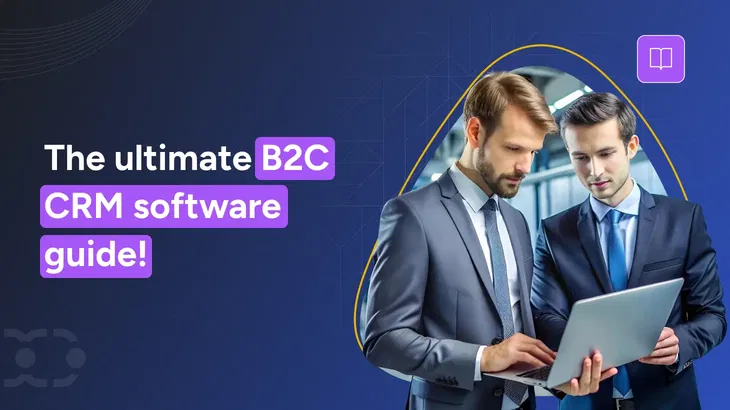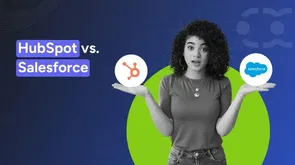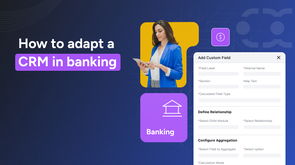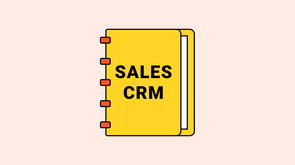CRM (Customer relationship management software) often seems to be a game changer for B2B businesses, though it is vital to scale up your business to consumer.
53% of businesses experience improved customer satisfaction and retention with CRM tools.
Unlike the traditional business to business approach, which focuses primarily on managing corporate clients, B2C CRM solutions tend to center on building stronger, long-term relationships with potential customers.
While the principles remain similar, the implementation and delivery differ significantly from B2B. Let’s explore how B2C CRM can transform the way you manage the customer journey.
What is B2C CRM?
A B2C CRM is a software solution specifically designed to help businesses manage sales pipeline and their interactions with individual consumers, rather than other businesses.
Unlike traditional B2B CRM, which focuses on managing a smaller number of complex business relationships with longer sales cycles, B2C CRM is built to handle large volumes of individual customers and more transactional, quicker interactions.
This software centralizes all critical customer data, such as buying behaviors, preferences, and purchase history, making it easier to create personalized experiences.
By bringing together all customer information in one platform, B2C CRM enables businesses to engage with customers across multiple channels, such as email, SMS, social media, and websites.
B2C CRM is all about streamlining communication and automating marketing processes. It fulfills businesses' need to scale their efforts by sending personalized messages to thousands or even millions of customers at once.
Difference between B2B and B2C CRM!
B2C CRM systems differ significantly from their B2B counterparts in terms of focus, functionality, and approach to managing customer relationships:
Aspects | B2B CRM | B2C CRM |
| Major focus | Managing relationships with other businesses | Managing relationships with individual customers |
| Target audience | Businesses and organizations | Individual customers/end users |
| Sales cycle | Long, complex sales cycle | Short transactional sales cycle |
| Relationship building | Emphasis on long-term partnerships and personalized service. | Focus on personalized experiences and engagement at scale. |
| Data management | Tracks company-wide data, including multiple contact level management within a business. | Tracks individual customer data security for personalized interactions. |
| Marketing strategy | Targeted marketing campaigns at decision-makers within organizations. | Mass marketing tailored to individual consumer preferences. |
| Pipeline management | Detailed tracking of deal stages and sales funnel health. | Less emphasis on pipeline management; focuses on high-volume transactions. |
| Average deal value | High-value deals ranging from thousands to millions of dollars. | Low-ticket transactional deals with high volumes of customers. |
| Automation features | Primarily supports sales processes like lead management, tracking, and forecasting. | It includes advanced marketing automation for campaigns, loyalty programs, and promotions. |
Benefits of a B2C CRM for your business!
Around 60% of companies use CRM solutions as a centralized communication hub to nurture leads in their business. A well-implemented B2C CRM system helps sales reps make sense of complex customer data by centralizing it into one powerful hub.
With this centralized data, businesses can create hyper-personalized experiences, offering the right product or service at the right time.
Here's how a top B2C CRM can be beneficial for your business:
-> Personalized marketing at scale
One of the most powerful features of a B2C CRM is its ability to help businesses craft personalized marketing messages.
By analyzing customer behavior and preferences, businesses can deliver tailored campaigns through various channels, such as email, SMS, social media, and web interactions.
These campaigns can be dynamic, adjusting based on how customers interact with previous messages, ensuring each communication feels personal and relevant.
-> Customer insights and actionable data
A CRM doesn't just collect data; it turns it into actionable insights. For B2C companies, understanding customers' buying habits, what they browse, when they make purchases, and how they interact with content is invaluable.
This helps businesses craft smarter strategies and improve customer satisfaction, leading to higher conversion rates and repeat purchases.
-> Behavior-driven engagement
With a B2C CRM, businesses can track specific behaviors, such as abandoned carts, product views, and past purchase patterns.
This enables them to trigger automated actions such as follow-up emails or retargeting ads, nudging customers toward completing their purchases or exploring new offerings.
By automating these touchpoints, businesses stay top-of-mind without needing constant manual input.
-> Improved customer retention
Attracting new customers is important, but retaining existing customers is equally, if not more, critical for B2C businesses.
CRM is designed to foster loyalty by providing a 360-degree view of every customer's sales management journey.
Personalized offers, product recommendations based on past purchases, and special discounts contribute to a seamless customer experience.
Customer satisfaction is more likely to return and share positive experiences with others, resulting in increased lifetime value and organic growth.
-> Enhanced customer support
A CRM also streamlines customer service channels by providing agents with complete customer profiles, including past issues, preferences, and order histories.
This allows for more efficient, personalized service. Whether resolving complaints or answering questions, agents can access everything they need at their fingertips, improving response times and customer satisfaction.
-> Cost saving and scalability
Cloud-based B2C CRM systems provide significant savings by reducing infrastructure costs, streamlining sales operations, and eliminating the need for in-house IT maintenance. These systems cut capital expenditures by replacing expensive on-premises hardware and offering automatic updates.
They also boost operational efficiency by reducing manual tasks and errors. On the scalability front, cloud CRM allows businesses to easily scale resources up or down based on demand, with pay-as-you-go pricing models that help control costs.
As businesses grow, these CRMs can handle increased data and users without requiring major system overhauls, ensuring seamless expansion.
-> Seamless multi-channel communication
A B2C CRM system, with its user-friendly interface, enables businesses to manage and track customer interactions across multiple channels: email, phone, chat, and social media, within a single platform.
This centralized approach ensures that all customer touchpoints are connected, providing a consistent and personalized experience.
By integrating these channels, businesses can respond promptly to customer inquiries, maintain context across interactions, and enhance overall customer satisfaction.
This unified communication strategy improves operational efficiency and fosters stronger customer relations, ultimately driving loyalty and business growth.
-> Integrations with other business tools
B2C CRM systems seamlessly integrate with marketing, e-commerce, and customer service platforms, creating a unified ecosystem that enhances operational efficiency and customer satisfaction.
This integration enables businesses to consolidate customer data from various touchpoints, providing a comprehensive view of each customer.
By synchronizing information across channels, businesses can deliver personalized experiences, automate workflows, and respond promptly to customer inquiries, improving engagement and customer loyalty.
Seamlessly integrate your tools with Salesmate!
Connect your favorite apps and platforms to streamline processes, enhance collaboration, and boost productivity.
Choose Salesmate: The ultimate B2C tool suite to double your profits!
Salesmate offers a comprehensive suite tailored for businesses engaging directly with consumers. Here is how Salesmate is an effective B2C CRM solution:
Contact management: Centralize all customer data, including contact details, communication history, and purchase behavior, to get a 360° view of every consumer.
Marketing automation: Launch targeted campaigns using segmentation, drip campaigns, and A/B testing.
Sales automation: Automate repetitive sales tasks such as lead assignment, follow-up reminders, and onboarding workflows.
Lead management: Use customizable web forms to capture leads from your website or social channels. Segment leads automatically based on their interests or behaviors for tailored follow-ups.
Sequences: Create a scalable sales follow-up with the combination of email marketing software that enables text and other activities for your business.
Sandy AI: Salesmate AI gives your sales team the ultimate edge, turning conversations into insights and closing more deals in less time.
Customizable reporting: Access real-time insights on customer engagement, campaign business performance, and sales trends to make informed decisions and optimize your B2C strategies.
Supercharge your business with Salesmate!
Unlock the power of seamless CRM, automation, and analytics to drive growth and maximize profits.
B2C CRM case studies to have a better understanding!
Exploring real-world B2C CRM examples offers valuable insights into how businesses across various industries leverage the best CRM B2C platforms to enhance customer engagement, streamline operations, and accelerate growth.
Here are several notable examples that showcase the impact of CRM systems:
1) Ray white real estate: Automating client nurturing to boost efficiency
Challenge:
Ray White, a leading real estate group with 880 offices across Australia and Asia, had difficulties managing thousands of clients' contact management data across multiple countries. Long sales cycles made follow-ups and lead nurturing challenging.
Solution:
Ray White adopted Monday CRM, customizing workflows and automating 1,300 tasks, including notifications, reminders, and customer emails. This centralized all business processes and communications, including property videos and checklists.
Results:
The company saw a 70% increase in operational efficiency, allowing agents to focus more on the sales journey and less on administrative tasks, leading to more consistent lead nurturing and better client relationships.
2) Casio: Improving sales with a unified CRM solution
Challenge:
Casio, the renowned consumer electronics brand, was using a custom-built CRM that didn't meet the needs of both their marketing and sales teams.
Solution:
Casio switched to HubSpot CRM, offering seamless integration for both inbound marketing and sales processes, ensuring a smoother transition between the functions.
Results:
The change led to a 26% increase in new customer sales, thanks to improved marketing automation, better customer management, and streamlined operations.
3) Hownd: Cutting CRM costs and supporting SMBs during crisis
Challenge:
Hownd, a company that helps local businesses drive foot traffic, needed to reduce CRM costs and quickly adapt to support small businesses struggling during the COVID-19 pandemic.
Solution:
They adopted a cost-effective CRM, streamlined workflows, and automated customer engagement to support SMBs during challenging times.
Results:
In just two weeks, Hownd reduced CRM costs by 80%, enabling it to continue helping SMBs thrive even in difficult circumstances.
4) Wells Fargo: Strengthening customer service with CRM
Challenge:
Wells Fargo, managing the property and assets of 70 million customers, required a CRM solution to provide excellent customer service and resolve issues quickly.
Solution:
The bank integrated CRM with social media channels and internal routing systems, ensuring customer journeys were immediately directed to the right departments.
Results:
Wells Fargo achieved one of the highest customer retention rates in the industry, demonstrating the critical role CRM plays in building strong, responsive customer relationships.
5) Jane’s small business: Revamping email marketing with CRM
Challenge:
Jane, a small business owner, struggled with poor email opening and click-through rates, affecting her marketing efforts.
Solution:
Using a CRM to segment her audience and personalize email content, Jane could tailor her messages to address subscribers by name and provide relevant offers to the account management.
Results:
This approach significantly increased open and click-through rates, driving more sales pipeline and business growth without hiring additional staff.
Wrap up!
A B2C CRM system is more than just a tool; it's a strategic asset that empowers businesses to streamline communication, enhance customer service, and accelerate growth.
By centralizing customer data, automating workflows, and providing actionable insights, B2C CRM enables businesses to foster stronger, more meaningful customer relationships.
CRM solutions can unlock many opportunities for scaling your business efficiently, from driving marketing automation and personalizing sales efforts to improving customer support and gaining a 360-degree view of your audience.
As you explore CRM options, consider their key benefits: cost savings, scalability, seamless integrations, personalized marketing, and enhanced customer service.
With the right CRM in a B2B and B2C sales CRM place, you can boost sales, improve retention, and ultimately, create loyal customers who drive your success.
Frequently asked questions!
1) What are the key features of a B2C CRM?
B2C CRM software is designed to help businesses manage and optimize interactions with individual customers. Some are the crucial features of the best CRM for B2C sales:
- Customer data management and segmentation
- Marketing automation
- Multichannel communication
- AI-powered features
- Reporting and analytics
- Integration capabilities
2) Can CRM software integrate with other tools?
Yes, the B2C CRM software can easily be integrated with the other tools, and this integration is a core feature that integrates its functionality, allowing businesses to centralize customer data and automate workflows across various platforms.
3) Does CRM automation reduce the personal touch in marketing?
CRM for B2C business does not inherently reduce the personal touch in marketing but enhances personalization by leveraging data and automation tools to deliver personalized experiences. Here is how the best B2C CRM software balances efficiency and personal connection:
- Personalized messaging
- Customer segmentation
- Real-time personalization
- Automated follow-ups
4) What are some best practices for using B2C CRM?
Some best practices for using the best B2C CRM effectively are:
- Keep data cleaned and updated
- Segment your customers
- Automate repetitive tasks
- Set clear CRM goals and an implementation plan
- Customize the CRM to your needs
- Provide comprehensive training







Key takeaways
CRM (Customer relationship management software) often seems to be a game changer for B2B businesses, though it is vital to scale up your business to consumer.
53% of businesses experience improved customer satisfaction and retention with CRM tools.
Unlike the traditional business to business approach, which focuses primarily on managing corporate clients, B2C CRM solutions tend to center on building stronger, long-term relationships with potential customers.
While the principles remain similar, the implementation and delivery differ significantly from B2B. Let’s explore how B2C CRM can transform the way you manage the customer journey.
What is B2C CRM?
A B2C CRM is a software solution specifically designed to help businesses manage sales pipeline and their interactions with individual consumers, rather than other businesses.
Unlike traditional B2B CRM, which focuses on managing a smaller number of complex business relationships with longer sales cycles, B2C CRM is built to handle large volumes of individual customers and more transactional, quicker interactions.
This software centralizes all critical customer data, such as buying behaviors, preferences, and purchase history, making it easier to create personalized experiences.
By bringing together all customer information in one platform, B2C CRM enables businesses to engage with customers across multiple channels, such as email, SMS, social media, and websites.
B2C CRM is all about streamlining communication and automating marketing processes. It fulfills businesses' need to scale their efforts by sending personalized messages to thousands or even millions of customers at once.
Difference between B2B and B2C CRM!
B2C CRM systems differ significantly from their B2B counterparts in terms of focus, functionality, and approach to managing customer relationships:
Aspects
B2B CRM
Benefits of a B2C CRM for your business!
Around 60% of companies use CRM solutions as a centralized communication hub to nurture leads in their business. A well-implemented B2C CRM system helps sales reps make sense of complex customer data by centralizing it into one powerful hub.
With this centralized data, businesses can create hyper-personalized experiences, offering the right product or service at the right time.
Here's how a top B2C CRM can be beneficial for your business:
-> Personalized marketing at scale
One of the most powerful features of a B2C CRM is its ability to help businesses craft personalized marketing messages.
By analyzing customer behavior and preferences, businesses can deliver tailored campaigns through various channels, such as email, SMS, social media, and web interactions.
These campaigns can be dynamic, adjusting based on how customers interact with previous messages, ensuring each communication feels personal and relevant.
-> Customer insights and actionable data
A CRM doesn't just collect data; it turns it into actionable insights. For B2C companies, understanding customers' buying habits, what they browse, when they make purchases, and how they interact with content is invaluable.
This helps businesses craft smarter strategies and improve customer satisfaction, leading to higher conversion rates and repeat purchases.
-> Behavior-driven engagement
With a B2C CRM, businesses can track specific behaviors, such as abandoned carts, product views, and past purchase patterns.
This enables them to trigger automated actions such as follow-up emails or retargeting ads, nudging customers toward completing their purchases or exploring new offerings.
By automating these touchpoints, businesses stay top-of-mind without needing constant manual input.
-> Improved customer retention
Attracting new customers is important, but retaining existing customers is equally, if not more, critical for B2C businesses.
CRM is designed to foster loyalty by providing a 360-degree view of every customer's sales management journey.
Personalized offers, product recommendations based on past purchases, and special discounts contribute to a seamless customer experience.
Customer satisfaction is more likely to return and share positive experiences with others, resulting in increased lifetime value and organic growth.
-> Enhanced customer support
A CRM also streamlines customer service channels by providing agents with complete customer profiles, including past issues, preferences, and order histories.
This allows for more efficient, personalized service. Whether resolving complaints or answering questions, agents can access everything they need at their fingertips, improving response times and customer satisfaction.
-> Cost saving and scalability
Cloud-based B2C CRM systems provide significant savings by reducing infrastructure costs, streamlining sales operations, and eliminating the need for in-house IT maintenance. These systems cut capital expenditures by replacing expensive on-premises hardware and offering automatic updates.
They also boost operational efficiency by reducing manual tasks and errors. On the scalability front, cloud CRM allows businesses to easily scale resources up or down based on demand, with pay-as-you-go pricing models that help control costs.
As businesses grow, these CRMs can handle increased data and users without requiring major system overhauls, ensuring seamless expansion.
-> Seamless multi-channel communication
A B2C CRM system, with its user-friendly interface, enables businesses to manage and track customer interactions across multiple channels: email, phone, chat, and social media, within a single platform.
This centralized approach ensures that all customer touchpoints are connected, providing a consistent and personalized experience.
By integrating these channels, businesses can respond promptly to customer inquiries, maintain context across interactions, and enhance overall customer satisfaction.
This unified communication strategy improves operational efficiency and fosters stronger customer relations, ultimately driving loyalty and business growth.
-> Integrations with other business tools
B2C CRM systems seamlessly integrate with marketing, e-commerce, and customer service platforms, creating a unified ecosystem that enhances operational efficiency and customer satisfaction.
This integration enables businesses to consolidate customer data from various touchpoints, providing a comprehensive view of each customer.
By synchronizing information across channels, businesses can deliver personalized experiences, automate workflows, and respond promptly to customer inquiries, improving engagement and customer loyalty.
Seamlessly integrate your tools with Salesmate!
Connect your favorite apps and platforms to streamline processes, enhance collaboration, and boost productivity.
Choose Salesmate: The ultimate B2C tool suite to double your profits!
Salesmate offers a comprehensive suite tailored for businesses engaging directly with consumers. Here is how Salesmate is an effective B2C CRM solution:
Contact management: Centralize all customer data, including contact details, communication history, and purchase behavior, to get a 360° view of every consumer.
Marketing automation: Launch targeted campaigns using segmentation, drip campaigns, and A/B testing.
Sales automation: Automate repetitive sales tasks such as lead assignment, follow-up reminders, and onboarding workflows.
Lead management: Use customizable web forms to capture leads from your website or social channels. Segment leads automatically based on their interests or behaviors for tailored follow-ups.
Sequences: Create a scalable sales follow-up with the combination of email marketing software that enables text and other activities for your business.
Sandy AI: Salesmate AI gives your sales team the ultimate edge, turning conversations into insights and closing more deals in less time.
Customizable reporting: Access real-time insights on customer engagement, campaign business performance, and sales trends to make informed decisions and optimize your B2C strategies.
Supercharge your business with Salesmate!
Unlock the power of seamless CRM, automation, and analytics to drive growth and maximize profits.
B2C CRM case studies to have a better understanding!
Exploring real-world B2C CRM examples offers valuable insights into how businesses across various industries leverage the best CRM B2C platforms to enhance customer engagement, streamline operations, and accelerate growth.
Here are several notable examples that showcase the impact of CRM systems:
1) Ray white real estate: Automating client nurturing to boost efficiency
Challenge:
Ray White, a leading real estate group with 880 offices across Australia and Asia, had difficulties managing thousands of clients' contact management data across multiple countries. Long sales cycles made follow-ups and lead nurturing challenging.
Solution:
Ray White adopted Monday CRM, customizing workflows and automating 1,300 tasks, including notifications, reminders, and customer emails. This centralized all business processes and communications, including property videos and checklists.
Results:
The company saw a 70% increase in operational efficiency, allowing agents to focus more on the sales journey and less on administrative tasks, leading to more consistent lead nurturing and better client relationships.
2) Casio: Improving sales with a unified CRM solution
Challenge:
Casio, the renowned consumer electronics brand, was using a custom-built CRM that didn't meet the needs of both their marketing and sales teams.
Solution:
Casio switched to HubSpot CRM, offering seamless integration for both inbound marketing and sales processes, ensuring a smoother transition between the functions.
Results:
The change led to a 26% increase in new customer sales, thanks to improved marketing automation, better customer management, and streamlined operations.
3) Hownd: Cutting CRM costs and supporting SMBs during crisis
Challenge:
Hownd, a company that helps local businesses drive foot traffic, needed to reduce CRM costs and quickly adapt to support small businesses struggling during the COVID-19 pandemic.
Solution:
They adopted a cost-effective CRM, streamlined workflows, and automated customer engagement to support SMBs during challenging times.
Results:
In just two weeks, Hownd reduced CRM costs by 80%, enabling it to continue helping SMBs thrive even in difficult circumstances.
4) Wells Fargo: Strengthening customer service with CRM
Challenge:
Wells Fargo, managing the property and assets of 70 million customers, required a CRM solution to provide excellent customer service and resolve issues quickly.
Solution:
The bank integrated CRM with social media channels and internal routing systems, ensuring customer journeys were immediately directed to the right departments.
Results:
Wells Fargo achieved one of the highest customer retention rates in the industry, demonstrating the critical role CRM plays in building strong, responsive customer relationships.
5) Jane’s small business: Revamping email marketing with CRM
Challenge:
Jane, a small business owner, struggled with poor email opening and click-through rates, affecting her marketing efforts.
Solution:
Using a CRM to segment her audience and personalize email content, Jane could tailor her messages to address subscribers by name and provide relevant offers to the account management.
Results:
This approach significantly increased open and click-through rates, driving more sales pipeline and business growth without hiring additional staff.
Wrap up!
A B2C CRM system is more than just a tool; it's a strategic asset that empowers businesses to streamline communication, enhance customer service, and accelerate growth.
By centralizing customer data, automating workflows, and providing actionable insights, B2C CRM enables businesses to foster stronger, more meaningful customer relationships.
CRM solutions can unlock many opportunities for scaling your business efficiently, from driving marketing automation and personalizing sales efforts to improving customer support and gaining a 360-degree view of your audience.
As you explore CRM options, consider their key benefits: cost savings, scalability, seamless integrations, personalized marketing, and enhanced customer service.
With the right CRM in a B2B and B2C sales CRM place, you can boost sales, improve retention, and ultimately, create loyal customers who drive your success.
Frequently asked questions!
1) What are the key features of a B2C CRM?
B2C CRM software is designed to help businesses manage and optimize interactions with individual customers. Some are the crucial features of the best CRM for B2C sales:
2) Can CRM software integrate with other tools?
Yes, the B2C CRM software can easily be integrated with the other tools, and this integration is a core feature that integrates its functionality, allowing businesses to centralize customer data and automate workflows across various platforms.
3) Does CRM automation reduce the personal touch in marketing?
CRM for B2C business does not inherently reduce the personal touch in marketing but enhances personalization by leveraging data and automation tools to deliver personalized experiences. Here is how the best B2C CRM software balances efficiency and personal connection:
4) What are some best practices for using B2C CRM?
Some best practices for using the best B2C CRM effectively are:
Juhi Desai
Content WriterJuhi is a passionate writer and reader. She is working with the team of content creators at Salesmate. Always seeking to learn something new, Juhi has an optimistic approach towards life. When she is not writing you can find her with a book and a coffee by her side.